Gotta Dance
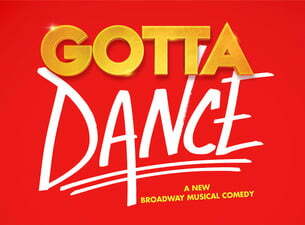 Book by Bob Martin and Chad Beguelin
Book by Bob Martin and Chad Beguelin
Music by Matthew Sklar
Lyrics by Nell Benjamin
Additional Music by Marvin Hamlisch
Directed and Choreographed by Jerry Mitchell
Produced by Broadway in Chicago
You’re Never Too Old for a Feel-Good Show
People excited for Gotta Dance, the new pre-Broadway try-out playing at the Bank of America Theater, will be pleased to know that the show delivers on all its promises, and then some. Based on a 2008 documentary with the same name directed by Dori Berinstein, this is the story of how a group of seniors formed a hip-hop dance troupe for a struggling NBA team’s half-time shows. Featuring songs by the late Marvin Hamlisch and a cast of much-beloved older actors who can still move gracefully, Gotta Dance is a predictable, but uplifting and uncondescending feel-good musical that can appeal to people of all ages.
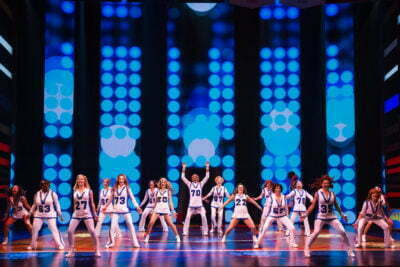
Tara (Haven Burton) is in charge of auditioning talent for a dance squad tentatively called “Nifty Shades of Grey,” which was the idea of the “New Jersey Cougars’” marketing department. She selects ten old people who show the most promise, and after inviting them to join the team, informs them that instead of the salsa, swing, tap, ballet, or any other dance form they’re trained in and enjoy, they’ll be performing the genre her “Courgarette” squad normally performs: hip-hop. One dancer drops out immediately, and the others are miffed, to say the least. Why exactly they stay is explored over the course of the play in a few of their cases, but only one, the unassuming kindergarten teacher Dorothy (Georgia Engel), discovers she has a genuine liking for rap and feels empowered by it. The others sense that Tara and her boss don’t really think they’re capable of any kind of dancing, and are determined to prove their doubters wrong.
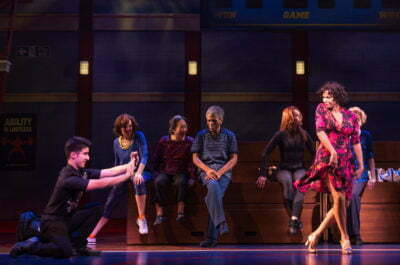
The weakness in Gotta Dance is that its entire plot depends on Tara being an astoundingly incompetent coach. In fairness, this is pointed out multiple times within the play by herself and everyone else. Tara was a member of the Cougarettes, but was forced to retire when she recently turned twenty-seven, and as compensation, was handed a coaching job she had no preparation, plan, or desire for. She flails at winning the seniors’ respect as badly as they flail at their new moves, despite her genuine desire for them to put on a good show. But it takes until the finale of Act I for her to explain that hip-hop’s “do you” message is the reason why she thinks the genre would have value for neglected seniors if they really listened to it, and it takes until the end of Act II for her to listen to her own advice and allow them to incorporate their actual skills into their routine. Until then, the troupe is plagued by self-doubt, infighting, and the sort of personal problems found in any story about a rag-tag bunch of misfits coming together to achieve something.
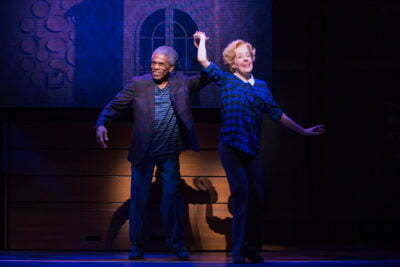
The story requires that most of the actors cannot show off any really great dance moves until it is near its end, but they are able to create endearing characters. Engel’s role as the stern, but quiet kindergarten teacher who discovers an outlet for her exciting alter-ego, Dottie, is the one most likely to wow audiences, and unsurprisingly, her ballad “Dorothy/Dottie” was one of two songs Hamlisch was able to complete. Besides being the first hip-hop song in the show, it’s also one of the best, and director/choreographer punctuates it with movements that look modeled on athletic poses. Hamlisch’s other major contribution, “The Prince of Swing,” is sung by André de Shields as Dorothy’s love interest, Ron. He’s a smooth charmer who prefers the intimacy of older dance styles, and his relationship with Dorothy feels remarkably unforced. The salsa dancer Camilla (Nancy Ticotin) is likewise unwilling to let go of her sex life, and her dance duet “¿Como No?” with the much younger Alexander Aguilar is a moment that deftly encapsulates Gotta Dance’s message about retaining the joy in life.
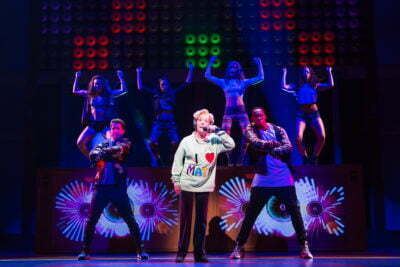
Composer Matthew Sklar’s darkest, and most emotionally effective song is “The Waters Rise,” sung by Mae (Lori Tan Chinn), the character who is normally the happiest, but has a husband with Alzheimer’s. Despite being the oldest and worst dancer, Mae is the heart of the group, in contrast to the deeply insecure and domineering former beauty queen, Joanne (Stefanie Powers). But Joanne’s experience in the dance industry leads to her becoming a mentor for Tara, in the show’s most honest and impactful spoken dialogue. The greatly experienced ensemble interact with each other quite believably, and the key to Bob Martin and Chad Beguelin’s success as bookwriters is their respect for the people at every point in life. It’s true that they do not delve into the issues facing the characters nearly as deeply as they could, and while Nell Benjamin’s lyrics for inspirational act closers “Swagger” and “Get Up” are rousing, others sound like they were inserted with a sledgehammer. But for a feel-good musical, Gotta Dance is well done indeed, and on the way out of the theatre, every face was cracked with a grin.
Recommended
Jacob Davis
[email protected]
Reviewed December 28, 2015
For more information, see Gotta Dance’s page on Theatre in Chicago.
Playing at the Bank of America Theater, 18 W Monroe St, Chicago. Tickets are $38-105; to order, call 800-775-2000 or visit BroadwayInChicago.com. Running time is two and a half hours, with one intermission. Plays through January 17, 2016.
